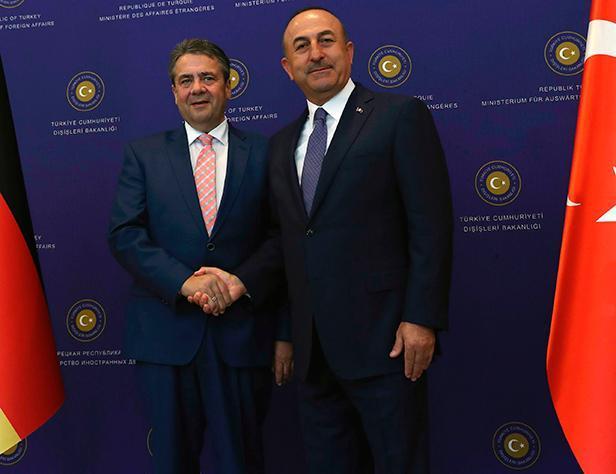Berlin offers new model for Turkey, EU

An EU agreement with Britain on relations after Brexit could serve as a model for ties with other countries that want to be as close as possible to the bloc but are not yet ready to join, such as Ukraine and Turkey, Germany’s Foreign Minister has said.
Britain secured the go ahead from Brussels to start talks on its future relationship with the EU earlier this month, with London saying it aspires to a closer relationship as a former member than that of any other third country.
In an interview with the Westdeutsche Allgemeine Zeitung published on Dec. 26, German Foreign Minister Sigmar Gabriel said such a deal could offer a solution to the puzzle of how the bloc of 27 can manage its ties with two other large non-members.
“I can’t imagine Turkey or Ukraine becoming EU members in the next few years,” Gabriel said.
“If we get a smart agreement with Britain regulating relations with Europe after Brexit, that could be a model for other countries - Ukraine and also Turkey,” he also said.
Turkey already has a customs union with the EU which allows the trade of most goods without tariffs.
One possibility would be to offer Ankara a “new, closer form of the customs union,” Gabriel said, although he also said such a project would have to “wait for changes in Turkey’s political environment.”
Both Turkey and Ukraine want to be full members of the EU, but the bloc is hesitant to include the two.
If full membership isn’t an option, Gabriel said, “we have to think about alternative forms of closer cooperation.”
Ties between Ankara and Berlin have been strained since the July 15, 2016, failed coup attempt, widely believed to have been masterminded by followers of the U.S.-based Islamic preacher Fethullah Gülen, as Turkish politicians criticized their
German counterparts for failing to show strong solidarity with the government against the thwarted coup.
Tension rose between the two NATO allies when President Recep Tayyip Erdoğan wished to address Turkish citizens in the European powerhouse ahead of the April 16 constitutional referendum.
Ankara also criticizes Berlin for turning a blind eye to outlawed groups like the Fethullahist Terrorist Organization (FETÖ), along with the outlawed Kurdistan Workers’ Party (PKK) and some outlawed leftist groups.
The EU’s insistence on Turkey to change its anti-terror law to benefit a lingering visa-free travel deal is also a source of the tensions between Ankara and Berlin.
Berlin, in return, has been calling on Turkey to free German citizens under arrest in the country. Around a dozen German citizens have been arrested on suspicion of aiding and abetting terrorist organizations, according to Turkey’s state-run Anadolu Agency.
Despite repeated calls by German politicians for the release of these suspects, the Turkish government said it was ruling out exercising any political influence on the judiciary and called to wait for the courts’ decisions.
Most recently, German journalist Meşale Tolu was released from jail last week after nearly eight months, prompting
Gabriel to voice hope for the improvement of the bilateral relations between the two NATO allies.
Another decision by Turkish authorities that was welcomed by Berlin was the allowance of pilgrim David Britsch to return to Germany.
“Decisions such as these give hope that we can rebuild trust step by step and relax the bilateral relationship,” Gabriel said in a statement released late on Dec. 21.
Gabriel said he had agreed with his Turkish counterpart Mevlüt Çavuşoğlu to continue talks given the “difficult issues” that still had to be resolved.
“Following recent rulings in Turkey, six persons have now been released from prisons or allowed to leave,” Gabriel said.
The releases came nearly two weeks after German federal prosecutors dropped an investigation against a dozen imams who were suspected of spying in Germany on behalf of the Turkish government.
















